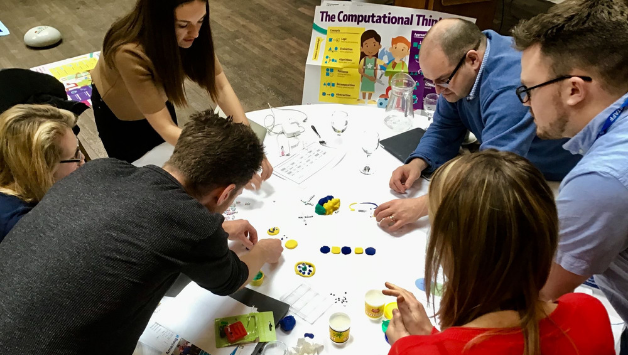Powering imaginations through computing CPD
24 April 2019

We spoke to Richard Smith, who has recently become a course facilitator for the National Centre for Computing Education, about his experience of delivering CPD. Here’s what he had to say:
I work in schools supporting computing and e-safety, and was delighted to be asked to deliver primary courses for the National Centre for Computing Education (NCCE) in Telford.
Government funding means that the courses are low cost or even free in some areas for state-funded schools, with a bursary of £100 per day for the school. This is such a wonderful opportunity. I always emphasise that staff attending are expected to use what they have learnt back in school so that it makes a real difference.
My training includes a range of theory and practical activities, with each day consisting of three or four sessions delivered in a total of six hours. Away from the hustle and bustle of school, I have found that teachers are delighted to have time to learn new content based on methods of teaching computing and the subject matter involved.
I make sure there are lots of practical activities which reinforce terminology such as algorithm, repetition and selection. One of the most successful sessions I’ve run involved asking a group to design a bracelet with three letters on it that was the name of an animal. The algorithm that was produced contained over 15 steps showing how specific you need to be when giving instructions.
The six hours of content per day means that there are lots of useful materials for participants to use back in school. When running a course, I find it’s important to be flexible and to tailor the course content and activities to suit the needs of the teachers attending. This often involves introducing a practical activity to build confidence in the use of vocabulary and key concepts.
The NCCE course materials have been written by experienced teachers such as Phil Bagge which gives you confidence. I was delighted that Duncan Maidens, who works for one of the NCCE’s Regional Delivery Partner’s (Birmingham City University) supported me in person. I also received some excellent materials from Barefoot that the delegates found useful.
Perhaps the hardest thing with any new initiative is to develop confidence in what you are doing. I found that I had to spend lots of time looking at the materials, adding some content that made it appropriate to local schools based on what I knew we had achieved already. I was also very aware that I must not rush through the content. The materials were theirs to take away so they could reflect on some of the theories and concepts at a later date.
Some of the courses take place over two days and require a gap task to be completed in between to reinforce learning. The online discussion space provided by STEM learning has been useful as a method of providing a space for dialogue between myself and the delegates.
I provide lots of equipment to encourage participants to develop confidence when working practically. I’ve been impressed that the materials provided by the NCCE encourages us all to reflect on diversity and equality of opportunity.
I hope that all of those coming on the courses will be more confident when working with students, be keen to deliver some training back in school and also be keen to develop their knowledge further through online or face-to-face courses from the NCCE.
Find out more about the National Centre for Computing Education
View upcoming courses
About the author:
Richard Smith runs a business called AmazingICT and is @amazingict on Twitter.